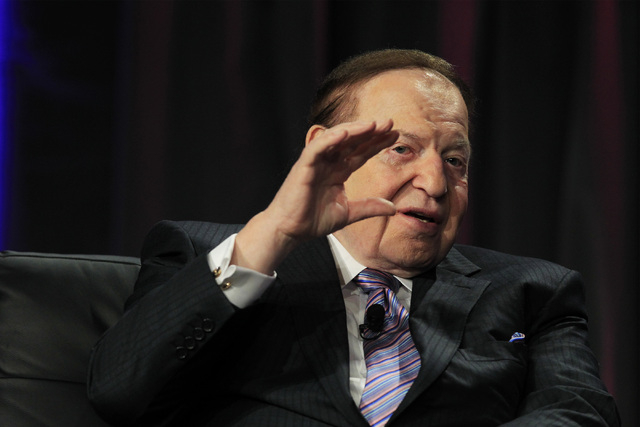Internet gambling bill not yet a priority

A congressional hearing on a bill to restore the Interstate Wire Act has lost steam in the current lame-duck session.
Pro-Internet gaming folks, however, aren’t taking the silence for granted.
The Justice Department ruled in December 2011 that the Wire Act applies only to sports wagering, paving the way for legal online gaming in the U.S.
Online wagering proponents worry the “Restoration of the Wire Act” legislation — introduced in March and supported by rabid Internet gaming foe Sheldon Adelson — will be added to an otherwise innocuous bill just before the session adjourns.
“The fight is not over,” Poker Players Alliance Executive Director John Pappas warned in a statement last week.
The measure most likely won’t be taken up until Congress convenes in January.
That view has online gambling proponents preparing for an all-out assault by forces backed by Adelson, chairman of Las Vegas Sands Corp. The 81-year-old billionaire was a megadonor to Republican candidates this year, some of whom are moving into House and Senate offices.
Adelson has made killing Internet gambling a political priority. He’s already spent millions of dollars in creating a coalition against the activity, bringing on high profile former elected officials— such as ex-New York Gov. George Pataki — to serve as spokespeople, and hiring lobbyists to take up the cause on a state-by-state basis.
Adelson used his keynote address at the Global Gaming Expo in October to reiterate the reasons why he opposes Internet gaming legalization. He shows no signs of slowing his efforts.
In an interview on “Ralston Reports” this month, Las Vegas Sands Vice President of Government Affairs Andy Abboud — Adelson’s right-hand political operative — said his boss’ resolve to kill online gaming hasn’t slowed.
“I think it’s been strengthened even more,” Abboud said. “He’s a man of great conviction. He doesn’t waiver. If he invades an island, he burns the boats at the shore. There is no turning back.”
That said, Adelson recently lost backers he might have once thought were on board.
Former Texas Rep. Ron Paul wrote on his Institute for Peace and Prosperity website on Nov. 16 that banning Internet gaming is “a winner for Sheldon Adelson” and “a losing bet for the rest of us.”
Paul, a Republican who was the 1988 Libertarian presidential candidate, said restoring the Wire Act gives government “new powers” over policing the Internet to prevent online gambling. Banning Internet gaming, Paul wrote, was an “unconstitutional infringement” and “will inevitably threaten all our liberties.”
A week later, the heads of eight conservative organizations, including Americans for Tax Reform — led by anti-tax icon Grover Norquist — asked congressional leadership to scuttle Wire Act legislation. They said the Justice Department was correct in its 2011 opinion: Internet gambling is a states rights issue.
“Regardless of your personal opinions on gambling, we encourage you to preserve the authority of the states to prohibit or regulate gambling as the 10th Amendment directs,” Norquist and others wrote in the letter. “The states have always led the way in regulating gambling.”
Adelson also lost a key ally when House Majority Leader Eric Cantor, R-Va., was defeated in the June primary.
The “Restoration of the Wire Act” bill was introduced by Rep. Jason Chaffetz, R-Utah, and Sen. Lindsey Graham, R-S.C. Half of the Republican members of the House Judiciary Committee are co-sponsors.
The Washington Post reported last week that Adelson’s lobbyists were pressing for quick passage of the measure. Discussions were held with aides to House Speaker John Boehner, R-Ohio, and Senate Majority Leader Harry Reid, D-Nev. Reid has long favored a congressional bill to legalize, regulate and tax Internet poker.
The pro-Internet gaming side is bracing for the fight.
The Casino Association of New Jersey released a resolution asking its state congressional delegation to reject the measure. The group believes the bill’s passage would roll back the state’s Internet gaming regulations.
Internet gaming — legal in just Nevada, New Jersey and Delaware — hasn’t been the financial windfall many expected, but that isn’t stopping other states, such as California and Pennsylvania, from considering Internet gaming legislation.
Where the Norquist group wants individual states to decide for themselves, Adelson does not.
“It’s not a states’ rights issue. The Internet is all over the country,” Adelson said during his G2E address.
If the Wire Act restoration bill makes it through the House, it still has to survive the Senate and win President Barack Obama’s signature. That last requirement is unlikely — Adelson spent $100 million in trying to defeat Obama in 2012.
That’s still of little comfort to the nervous Internet gaming crowd.
“Now more than ever, it is crucial that we remain vigilant to ensure political influence doesn’t win out over what’s in the best interest of consumers,” Pappas said.
Howard Stutz’s Inside Gaming column appears Wednesdays and Sundays. He can be reached at hstutz@reviewjournal.com or 702-477-3871. Follow on Twitter: @howardstutz.












